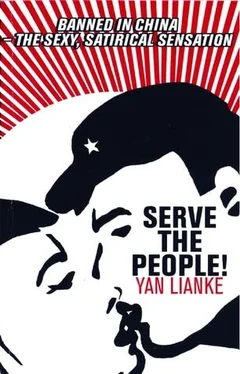Yan Lianke
Serve the People!
THE NOVEL IS THE ONLY place for a great many of life's truths. Because it is only in fiction that certain facts can be held up to the light.
The novel it is, then, for this particular truth.
The story I'm about to tell, you see, bears some resemblance to real characters and events.
Or-if I may put it this way: life has imitated art, re-rehearsing the plot of Serve the People!

Wu Dawang, Sergeant of the Catering Squad, now General Orderly for the Division Commander and his wife, stood in the doorway to the kitchen, a bunch of pak choi in hand, acknowledging a devastating new presence in the room. The wooden sign ordering its beholder, in bright red letters, to `Serve the People!' had moved from its usual place on the dining table and on to the kitchen work top. To the left of the exhortation, five stars gleamed; to the right, a water canteen dangled from a rifle while a luxuriant row of wheat bristled beneath.
The pride of the entire division, an exemplar, a model of political correctness, the Sergeant enjoyed an extraordinarily well-developed understanding of the sign's symbolic language. The five stars (the Revolution) together with the rifle and canteen (the Party's history of armed struggle) were reminders of the long, arduous path to Revolution. The wheat pointed to the glorious future: of glorious harvests in the glorious times to come once Communism had been realized.
This sign, its letters burning scarlet against a whitewashed background, its stars, rifle, canteen and wheat emblazoned in red andyellow, had come home one day with the Division Commander. He had gazed solemnly at Wu Dawang as he laid it on the table. 'Do you know what this sign means?' he asked, while his General Orderly set down dishes of food before him.
After a long, hard look, Wu Dawang produced a careful critique.
`Good,' declared the Commander, his face brightening slowly into a smile. Very good, in fact-much better than them.'
Though Wu Dawang didn't know who the Division Commander meant by `them', he did know, and better than most, the People's Liberation Army's three rules of thumb- Don't Say What You Shouldn't Say, Don't Ask What You Shouldn't Ask, Don't Do What You Shouldn't Do. He therefore went back to the kitchen to prepare soup for the Commander and his wife. And from that moment on, the sign became the most distinguished, most illustrious resident of the dining table, casting its mighty symbolic shadow over the lowly bottles of vinegar, chilli sauce and sesame oil.
The days passed, one after another, as time trickled peacefully, indeterminately through the barracks. Every day at dawn, before reveille, the Commander would come downstairs, immaculately uniformed, and set out for the parade ground-for his daily round of drills, andyet more drills. Every night, long after lights-out, he would return home exhausted, take off his uniform, wash his face, brush his teeth and climb upstairs to bed. Revolution and work were the epicentre of the Commander's life, dominating his entire being. Since earliest boyhood, he had held up the Great Events in Our Nation's History-the Sino-Japanese War, Land Reform, the Fight for Liberation-as ayardstick against which to measure the significance of his every day of existence. Even now, on the wrong side of fifty and gazing down the slope to old age, he still relied on the same gauge to calibrate the meaning of his life.
His young, pretty wife Liu Lian, by contrast, led a much less meaningful life. A nurse by training, and seventeen or eighteen years his junior, she hadn't set foot in a hospital since her marriage. No one knew whether she'd given up work voluntarily, or because her husband had wanted her to, but for a full five years now she had stayed at home, ruling this senior officer's roost, keeping company only with the four walls around her and the prestige of their master.
Of Liu Lian, Wu Dawang knew next to nothing. Before he'd taken up his present post, he'd known nothing at all. He had no idea where she'd grown up or when she'd joined the army as a nurse. He didn't know she hadn't worked for five years or, apart from mealtimes, what she did upstairs all day. He didn't know whether the army still paid her salary even though she didn't turn up to work; whether she was from a military family; whether she'd forgotten army protocol in the years she'd been out of uniform. To him, her personal history was a gigantic blank, a mountain range shrouded in impenetrable mist. Beneath the blankets of cloud, the peaks might have been desolate crags emerging from ravines, or carpets of green serenaded by songbirds and festooned with gorgeous flowers and gurgling brooks; but Wu Dawang had no way of telling.
Because these were matters of which he knew nothing, he paid them no attention; and because he paid them no attention, the Division Commander delighted in his choice of orderly. Even though Wu Dawang was a veteran revolutionary of several years' service, even though his personal file was piled vertiginously high with honours, despite all his commendations, awards and citations, despite the fact that twice ayear the brigade's Head of Management would name him Model Soldier as unhesitatingly as one would hand a narcoleptic a pillow, still he wanted more-much, much more. Wu Dawang was, in short, a man greedy for laurels, an exceptional soldier fixated on promotion. And it was after one particularly exhilarating performance at a Mass Theory and Practice of Frontline Logistics Competition-in which Wu had recited, word-perfect, 286 quotations and three classic essays ('Serve the People', `Commemorating Norman Bethune' and `The Foolish Old Man who Moved the Mountains') by Chairman Mao; had dug a stove, chopped ingredients and presented an immaculate gourmet banquet of four dishes and a soup all within thirty minutes; and had, yet again, been lauded up and down the barracks ranks as Model Soldier-that the Division Commander had selected him as his full-time orderly and cook.
`What is it you must always remember,' the Head of Management had asked, `whenyou start work for the Commander?'
'Don't ask what I shouldn't ask, don't do what I shouldn't do, don't say what I shouldn't say,' he replied.
`And?'
`To serve the Division Commander is to Serve the People.'
'More important even than that,' the Head of Management added, `you must mean what you say, unite theory with practice, and make sure your actions speak as loud as your words.'
'Please reassure the Commander that I will speak as I think, and act as I speak, that I will be both Red and Expert.'
'Excellent,' the Head of Management said. 'Off you go then, and I'm sure more accolades will come your way soon.
And with that, Wu Dawang was transferred to the Division Commander's own household.
For the past six months, he had stuck cautiously, conscientiously, scrupulously to his brief: he had cooked, grown vegetables, kept the floor and the front yard spotless, tended the herbaceous borders and pruned the trees regularly. After a short spell of home leave, he'd barely left his new place of work — Number One in the senior officers' compound-this whole time. Because of Wu Dawang's tireless dedication to duty, and because of the Division Commander's almost obsessive zeal for the tasks of the Revolution and of the Party, during a recent, centrally orchestrated Streamline-and-Regroup Initiative, the Commander had set an example for everyone by cutting his own household staff to one. This meant that now only two people were left rattling around this Soviet-built military residence once the Commander had gone to work each morning: Liu Lian, the Commander's thirty-two-year-old wife, and Wu Dawang, his twenty-eight-year-old General Orderly- like a single rose and a hoe left abandoned in a vast, bare flower bed.
Читать дальше













